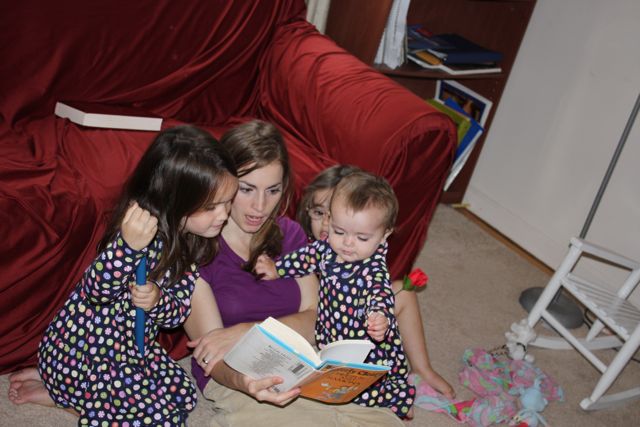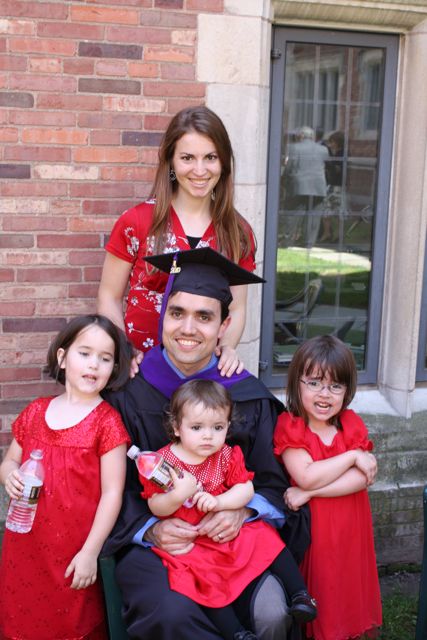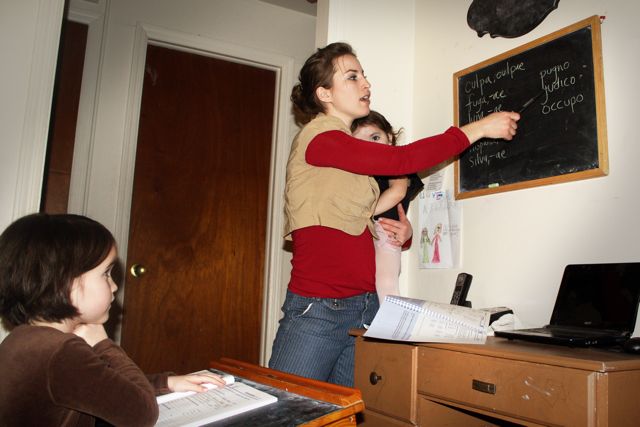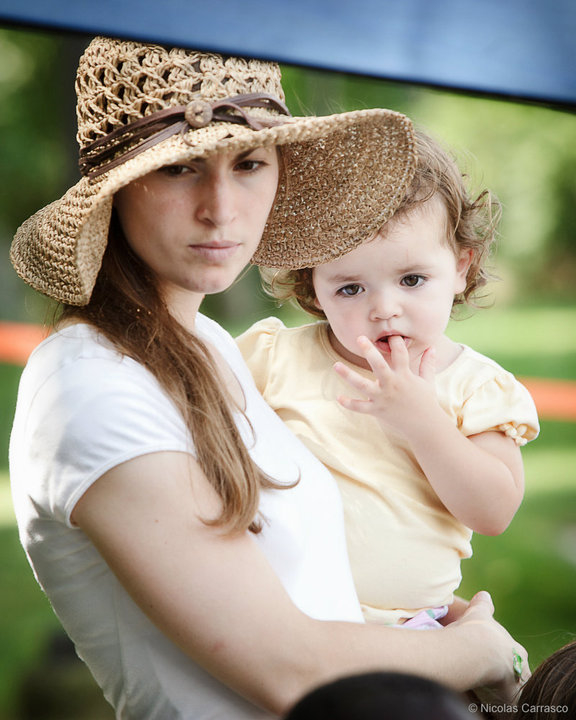A student of Latin and Greek and a budding education reformer, Lia Collings is already engaged in teaching her three young daughters about these things she loves. Lia takes inspiration on how to intertwine her scholarly and motherly pursuits from the passel of mothers in her New Haven, CT, branch. She solicited and compiled a book of essays about their experiences, which she entitled Choosing Motherhood.
Tell me about your book, Choosing Motherhood.
Choosing Motherhood actually originated as Letters to My Daughters: “Dear daughter, this is my experience….” I wanted to help my daughters in twenty years when they’re facing their own decisions about career and motherhood. But then my aim spread from trying to help my own daughters to helping women right now. As I was formulating what I was going to do, I read a talk Sister Beck gave to seminary and institute teachers related to teaching the doctrine of the family [also featured in the March 2011 Ensign]. She says that the rising generation doesn’t have faith that they can form successful families. I thought that hearing stories from these women who knew they could be successful in the standard arenas, but who took this leap of faith and chose to be mothers would help other women making the same decisions now. That is what the book is.
I have three daughters; they’re little. I am a feminist, a really strong feminist because being amazing and awesome is just what women do. So, of course I want my girls to be that way and be awesome and be intelligent because that is what I am trying to raise them to be—and faithful of course. But, I don’t want to raise them to have all these talents and then have them turn their back on being a mom.
My husband is a gradate student at Yale University, so in our ward here in New Haven, CT, I’m surrounded by highly educated, capable women who have chosen to be mothers. The book is their stories, what made them decide to choose motherhood.
At first, I just chose a few women, just really amazing moms, who took all the passion and the intelligence and the using-my-talents-and-magnifying-them that they would have put into a career and put it into being a mom. Because they applied their minds to their mothering, they didn’t feel unfulfilled. This wasn’t the case for me because before being a mom I had been working on the Joseph Smith Papers and doing all this fun intellectual stuff, and so it was an abrupt shift to give that up. It is hard for me when my children are babies, since I don’t love cuddling with babies; I never played with dolls as a child. This is silly, but I didn’t think to change my babies into pajamas to go to bed until I was reading a Raggedy Ann story like a year ago. I was a mom for six years before I realized that. But I love learning. I love teaching. I love exploring and engaging. So it’s hard for me when they’re really little and I can’t do those things as easily with them.
One of my goals is to speak to highly educated mothers who feel like they’ve wasted their education if they’re “just a mom.” That was me five years ago. Right now my really important contribution is teaching my children the gospel and nurturing a righteous family. In large part, I learned that from the other women in this intellectual church community where intellectual women are showing me how I can still learn and develop, even at home. And by the way, you’re not “at home.” I hate that phrase “stay-at-home mom” because you’re not staying at home. You go crazy if you stay at home!
How do you balance your own development with your children’s development and those dreams that you had that you have put aside for a while?
Obviously I still have a mind that I want to use. So I read a lot. All the time, I guess, since we don’t have TV. I think reading’s a good way to develop yourself and your children at the same time, because even if it’s a children’s book about giraffes, I still learn a whole lot about giraffes! Also, I’ve chosen to develop talents that will enrich my family. For example, I have been making our bread for years. For four years I’ve made all our bread, and then this year for Christmas I asked for The Bread Baker’s Apprentice so I can branch out that skill to making artisan breads.
Enjoying the stage we’re in is another thing I’ve learned from the mothers who surround me. One friend, for example, has a master’s in art history, and she got close to finishing her doctorate. But she was about to deliver her second baby and so she put her academic life on hold to prioritize her children. At one point in my life, I would have been bitter about sacrifices like that, but this friend taught me that it’s okay to channel my energies into developing talents that jive better with my current stage of life. This friend loves French cooking and pastries, she set the goal to make a hundred pies. Now she’s the Pie Queen. That’s a talent (and a title) that she couldn’t develop later when she goes back into academia.
I studied Latin and Greek, which I love and which you have to be engaged in to stay on top of. Now, here I am six years after graduation, and I don’t remember anything. So, I am starting Julia, my six-year-old, on Latin through a homeschool program. I got an English grammar that we are working through so she will know verb and direct object and subject, and things like that. Julia and I have started on Latin and then in two years when Ellie starts school I’ll start both of them on Greek at the same time. And then when Katharine starts school I’ll start Ellie and Katharine on Latin together. I’ll know it so well by the time they are done that I’ll have refreshed it all for myself, and I’ll also know which elementary and secondary school curricula work and which don’t.
One of my goals is to get involved in education reform. I had started a master’s degree in public policy with an emphasis on education that I decided to drop out of because I had a little baby. At the time it was a big sacrifice to leave that program, but now I know so much more about myself as a person and about the world. I’ll make a much better student and professional when I go back to it. I grew up in Utah and went to BYU, which is a great education, but it really is a bubble. At that time I only had my own education to go off of—what I liked about my own education and what I didn’t like about my own education. And I thought I could go reform the world on that or what my teachers said or what I read in books. But now when I go back, I’ll have New Haven school systems as part of my experience, too. We are going to Germany this year. I’ll have that whole school system, which I think is really interesting. Wherever we’ll be moving, and as a parent with all these different children who learn differently, I’ll be learning too.
My oldest daughter is very rules oriented and so grammar is going really well with her. My second one is a total auditory learner. We memorize poems, and she memorizes them much faster than the six-year-old. She’s like a little Dr. Seuss—she’s unbelievable with words. She just makes them up. She’s four, and she’s telling this little kid on the playground, “Do you see my sister over there? She’s scurrying away. She’s the one scurrying.” What four-year-old uses the word “scurrying”? So, I’ll be so much better prepared to really do something to reform education later on after all this experience I’m getting.
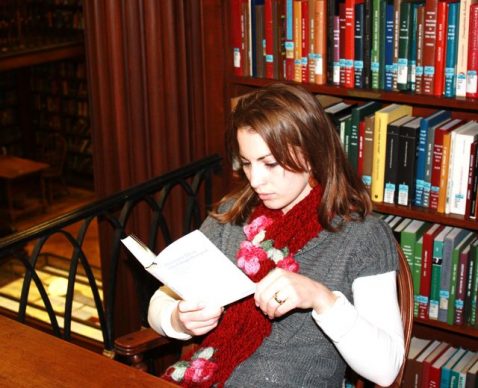
What ideas would you like to implement in schools?
I think, for primary education, the Greek model of music, dance, and logic/rhetoric is so smart. I would love to start a charter school—these are my ideal ambitions—for even inner-city kids whose parents are not involved. I want to teach them about dance. We all have this natural urge to move our bodies, especially little kids. They’re just moving all the time and destroying things, and so you teach them to channel that movement into constructive forms. Or my children love to yell so we do lots of singing that channels that. For the older grades, probably second or third grade, I would include Latin. My educational ideals include getting down to the roots, the reasons behind things. When my girls started getting old enough that they could help me clean, I got Martha Stewart’s housekeeping book, Homekeeping Handbook: The Essential Guide to Caring for Everything in Your Home. So I could say, “This is what you wipe a table off with, not because this is how my mom did it and so that’s what we do but because this is a stone surface. Stone surfaces respond to this kind of cleaner. This is the reason behind it.” Latin is this base—basic little pieces of the sentence form. You understand language better when you know Latin. You think about it more. It is the same reasoning for studying math or something like that. It’s a logical building block.
How does your desire to educate your children connect with your gospel understanding?
I think that we kind of come with the seeds of all these different personality traits that can come out. Maybe some of them grow more because of how your parents are or because some of it is just a really strong plant—it’s a really strong trait that you came with. There’s good and bad, too. Maybe because of your surroundings or what choices you make or whatever, sometimes the bad things get watered and grow instead of the good things. If we talk about it in context of the Atonement, at some point along the way, as you get older—I don’t know if it’s just age and experience that increases righteousness—you try to improve and you come to recognize, These bad plants are part of me, and I don’t want them anymore. The Atonement can take that plant out, remove it totally. That’s amazing.
Education is about nurturing these natural seeds. Going back to my example of little kids wanting to move their bodies, they can either go wild and move their bodies to hit people and kick and scream, or they can learn to dance with their bodies or to play soccer or any number of things. Education is directing those desires and watering the best and noblest plants. Maybe the same plant that could go bad could go good as well. I think educating your desires is teaching your soul to fly. If children are just left to gather whatever water they can for these little plants, who knows what’s going to happen?
What do you teach your children?
When I left academic life to be home with my baby, I was determined that she was going to know Latin. So when I would nurse her I would read her the Latin New Testament out loud. We have How the Grinch Stole Christmas in Latin, so I would read that to her. Then one night we had Family Home Evening with our friends who are totally not “intellectual” people but have these amazing testimonies. They are such thoroughly good people. I came home from that night with those good people and wrote in my journal, “What good will their knowing Greek and Latin do them if they don’t have a testimony that Jesus is their Redeemer and that Joseph Smith was a prophet of God?”
The most important thing to teach your children is what the Book of Mormon says: “We talk of Christ, we rejoice in Christ, we preach of Christ . . . that our children may know to what source they may look for a remission of their sins” (2 Nephi 25:26). Our family just went through an experience with repentance and forgiveness. You are hurt because you have hurt someone else, or you are hurt because someone else hurts you. Either it can ruin your life, or you can know to turn to Christ. That’s what we need to teach our children.
Every problem I see, the answer is in the gospel. My girls are memorizing the poem,
He who knows not, and knows not that he knows not, is a fool. Shun him.
He who knows not, and knows that he knows not, is a child. Teach him.
He who knows, and knows not that he knows, is asleep. Wake him.
He who knows, and knows that he knows, is wise. Follow him.
That’s a Persian proverb, and I think it encapsulates the gospel.
The person who “knows and knows not that he knows is asleep. Wake him”—that’s missionary work! The “wise men who know that they know” are the prophets. We need to follow them.
How do you sort out the finer distinctions of faith and knowledge, maintaining a faithful perspective while also being very knowledgeable?
I read my scriptures every day. I think one of my pettier temptations is wanting to have pretty clothes, but we just don’t have the money for that right now. Maybe I’m incredibly wicked, but if I skip a day of scripture study, I start thinking, “It wouldn’t matter if we went into debt just a little bit this month for me to get some new clothes…” But, even if I haven’t landed specifically on a “costly apparel” chapter, the things in the Book of Mormon are the important things. It really is faith, repentance, just turning to the Lord. That’s all that matters. And the Book of Mormon is so clear. I love the Book of Mormon. Reading the scriptures every day is a sign of humility, and praying beforehand, “Please teach me.” I have had so many experiences where I am not even looking for an answer to whatever problem, but it comes because I am reading the scriptures. You have to do that.
If my faith is hesitant towards an action I should be doing, I just do it anyway. I have a very strong testimony of “If you do His will you shall know the doctrine.” Major things. Like, I didn’t want to get married. My plan was, I will not be married before I’m twenty-five. As it turned out, I had three kids when I was twenty-five. But I knew at twenty when the opportunity came that getting married was what I was supposed to do, so even though I didn’t have faith in the institution of marriage, I got married anyway. I didn’t gain my testimony of eternal marriage until five years into it. It wasn’t like, oh, you know, this is actually really great! It took time. And it was the same thing with motherhood. I was never a little girl who was really looking forward to doing the mom thing. But if our goal here is to become godlike and to root out all of those weeds, all those bad plants I was talking about earlier, motherhood is the way. Everything that bothers me in my children they got from me, even little things. I never thought of myself as a dramatic person, but my children are all really dramatic. I am realizing that I am dramatic. Even mannerisms – these little plants grow without our realizing it, and motherhood is a really effective way to bring it to our attention. If the point is to be godlike, if “making it” means becoming godlike, then the little primary song, “God gave us families to help us become who he wants us to be” is totally true.
I learned from one of my mentors at the Joseph Smith Papers that, “Some things you just have to set on the back burner. Some things I’m not reconciled with but sometimes I bring it out of the back of my mind and chew on it a little. Sometimes I’m at a point where I can resolve it.” A lot of it is just being willing to admit you don’t know everything, and we won’t know everything. What are the important things? I like Latin because it gives you the reason behind the language. I get the Martha Stewart handbook because it tells me why we use this cleaner. I feel like the gospel does that for me, it gives me the “whys.” My goal with teaching my children is to give them those same “whys.”
Last fast and testimony meeting I bore my testimony about fasting. If you think about it intellectually, why would fasting bring you the Spirit? I don’t know. It seems totally illogical. But these last four months are the only months I have been able to fast in our marriage because I was either pregnant or nursing all of the other months. And I don’t know what it is about just not eating, but I totally feel the Spirit. I don’t know how it happens. But I know that it’s true because I am doing it.
At A Glance
Lia Collings
 Location: New Haven, CT
Location: New Haven, CT
Age: 27
Marital status: Married
Occupation: Mother
Children: Three
Schools Attended: Brigham Young University
Languages Spoken at Home: English
Favorite Hymn: “Be Still My Soul”
On The Web: Choosing Motherhood at Amazon.com
Interview by Elizabeth Pinborough. Photos by Caci Chapman and Nicolas Carrasco.
At A Glance

